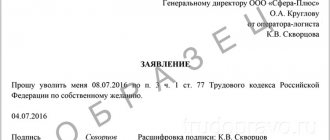11/19/201811/19/2018 17:38 Labor consultant
In accordance with labor legislation, a contract with an employee can be terminated only if there are appropriate grounds for this action. These reasons include the following circumstances:
- expiration of a previously concluded agreement or performance of one-time work that was the direct subject of the agreement;
- drawing up of a special dismissal agreement by the parties. This document can spell out all the nuances of the future severance of labor relations;
- the desire of the employee himself, which he expresses in his resignation letter;
- violation by the employee of certain rules of labor legislation, as well as the provisions of the company’s internal discipline;
- the emergence of circumstances that do not depend on the will of the parties, but make further continuation of the employee’s work activity impossible. This may include, for example, a deterioration in the employee’s health, the employee’s call to military service, the liquidation of a company, etc.
Regardless of the reasons for the termination of the employment relationship, the dismissal procedure itself must be carried out by a responsible person, in accordance with the current rules. Otherwise, the dismissed employee will be able to protect his violated rights by contacting the authorized organization with a complaint. If the decision is made in favor of the employee, the citizen will be reinstated in his previous position and will also receive compensation for the time of his forced absence from the workplace.
Moreover, the manager may face sanctions provided by law for violating the rights of an employee and carrying out illegal dismissal. The main ones will be expressed in the establishment of a monetary fine. Its amount can reach 50,000 rubles for legal entities. If we are talking about repeated violations by the employer, the amount of the penalty will be significantly increased.
During his dismissal, the employee must clearly understand and realize why exactly the manager is applying this punishment to him. If the employer prefers not to explain anything at all, it should be remembered that such actions by the boss are fundamentally unlawful. In this case, it is necessary to start preparing documents as soon as possible for subsequent application to a judicial institution or to the Labor Inspectorate.
Legal features
Article 278 of the Labor Code of the Russian Federation is called “Additional grounds for termination of an employment contract with the head of an organization.” Even from the name you can see that managers of enterprises and other organizations can be fired for a more extensive list of reasons than ordinary ordinary employees.
Dismissal is the termination of the employment relationship between an employee of an organization, on the basis of which he is not obliged to further perform his official duties. The employer is relieved of the obligation to pay him remuneration.
Article 77 of the Labor Code of the Russian Federation describes the reasons why any employment relationship can be terminated:
- mutual agreement of both parties;
- the completed term of the concluded employment contract;
- termination of the contract at the initiative of the employer or the employee himself;
- transfer to another place with his consent or request;
- for other reasons that do not depend on the wishes of either party.
Dismissal must be formalized according to the rules established by federal and regional legislation, since non-compliance will be considered an administrative offense leading to a fine of up to 50,000 rubles.
Article 278 of the Labor Code of the Russian Federation allows you to dismiss, without explanation, any head of an organization working in it on the basis of a concluded and valid employment contract, if the board of directors, shareholders or founders made such a decision at their general meeting, and the data on this was necessarily correctly entered into the minutes.
https://youtu.be/DaNyh8N714g
Compensation for the manager upon dismissal
The procedure for dismissing a manager has a number of important differences. Firstly, if we are talking about termination of the contract by decision of the judicial authorities, then the person is deprived of a number of social guarantees, in particular, the offer of another place of service, payment of a two-week salary.
Secondly, there are special privileges:
- provision of compensation, the amount of which is not less than three months’ salary;
- prohibition on dismissal during vacation or temporary disability.
It is important to know! Even if the employment contract does not indicate the obligation to pay compensation, the employer must provide it. The amount is calculated based on the average daily income of a citizen, taking into account bonuses and other remunerations. The period for analysis is the last twelve months.
Additional cash benefits are not paid if the dismissal is due to the bankruptcy of the enterprise, the expiration of the contract, or the initiative of the employee himself. But if the owner of the company’s property changes, then the transfer of compensation is necessary.
Reasons for use
It is clearly stated that using this article, relations can only be terminated with the head of the organization. In a number of individual cases, his deputies and the chief accountant may suffer. List of reasons for which the article can be used:
- Dismissal due to the removal of the head of an organization from his position, for which the arbitration court is conducting a bankruptcy case.
- The decision of the authorized body of the enterprise to make decisions on termination of the existing employment contract with the head of the enterprise, in the manner regulated by law.
In a number of situations, wage violations may serve as valid grounds. Also, the dismissal process may be affected by other grounds established by the Labor Code of the Russian Federation. Despite the vagueness of this paragraph of the article, the grounds provided must be described in competent and specific formulations related to the person’s performance of his or her job duties.
Commentary on Article 278 of the Labor Code of the Russian Federation
An employment contract with the head of an organization can be terminated on all grounds provided for in the Labor Code and other federal laws. In some cases, in accordance with paragraphs 4, 9, 10 of Article 81 of the Labor Code, along with the head of the organization, his deputies and the chief accountant may be dismissed.
Article 278 of the Labor Code considers the grounds for termination of an employment contract exclusively with the head of the organization. For example, in accordance with Article 69 of the Federal Law of October 26, 2002 N 127-FZ “On Insolvency (Bankruptcy)”, the arbitration court, at the request of the temporary manager, has the right to remove the head of the debtor from office. The debtor's managers are the sole executive body of the legal entity or the head of the collegial executive body, in addition, another person carrying out activities in accordance with federal law on behalf of the legal entity without a power of attorney. In the event of a petition to the arbitration court to remove the head of the debtor from office, the temporary manager simultaneously sends copies of the petition to the head of the debtor, a representative of the founders (participants) of the debtor or another collegial management body of the debtor, a representative of the owner of the property of the debtor - a unitary enterprise.
If the petition is satisfied, the arbitration court issues a ruling to remove the head of the debtor and to assign the duties of the head of the debtor to a person nominated as a candidate for the head of the debtor by a representative of the founders (participants) of the debtor or another collegial management body of the debtor, a representative of the owner of the property of the debtor - a unitary enterprise, in If the specified persons fail to submit a candidacy for the acting head of the debtor - for one of the deputy heads of the debtor, in the absence of deputies - for one of the debtor's employees.
At the stage of financial recovery of the debtor organization, the administrative manager or the meeting of creditors, in the event of improper execution by the head of the debtor of the financial recovery plan or if the head of the debtor commits actions that violate the rights and legitimate interests of creditors, may petition for the removal of the head from office. In other words, the employer, on the basis of paragraph 1 of Article 278 of the Labor Code, has the right to terminate the employment contract with the head of the organization.
The manager may be dismissed on the basis of a decision of the general meeting of the founders (participants) of the debtor, a body authorized by the owner of the property of the debtor - a unitary enterprise, when deciding to apply to the first meeting of creditors with a petition to introduce financial rehabilitation, on the basis of paragraph 2 of Article 77 of the Federal Law " On insolvency (bankruptcy)."
The head of the debtor may be dismissed by an external manager (at the stage of external management) or a bankruptcy trustee (at the stage of bankruptcy proceedings).
Clause 2 of Article 278 of the Labor Code provides the possibility of terminating an employment contract with the head of an organization by decision of the authorized body of a legal entity, or the owner of the organization’s property, or a person (body) authorized by the owner. A similar rule is contained in Federal Law No. 208-FZ of December 26, 1995 “On Joint Stock Companies.” The general meeting of shareholders, if the formation of executive bodies is not within the competence of the board of directors (supervisory board) of the company, has the right to decide on the early termination of the powers of the sole executive body of the company - director, general director. If the formation of executive bodies is referred by the company's charter to the competence of the board of directors (supervisory board) of the company, the latter has the right to decide on the early termination of the powers of the sole executive body of the company - director, general director. The same rule was established by Federal Law No. 14-FZ of February 8, 1998 “On Limited Liability Companies”. The charter of a limited liability company may contain a provision that the competence of the board of directors (supervisory board) of the company includes the formation of the executive bodies of the company and the early termination of their powers. If the company has not formed a collegial management body, the early termination of the powers of the executive bodies of the company falls within the competence of the general meeting.
In this case, the employment contract can be terminated at any time before the expiration of its term and regardless of whether the head of the organization has committed any guilty actions or not.
Article 3 of the Labor Code prohibits restricting anyone’s labor rights and freedoms depending on their official position. The dismissal of the head of an organization in connection with the adoption by an authorized body of a legal entity or the owner of the organization’s property, or a person (body) authorized by the owner of a decision on the early termination of an employment contract is a dismissal on the initiative. Therefore, in accordance with Part 3 of Article 81 of the Labor Code, the dismissal of an employee at the initiative of the employer during a period of temporary incapacity for work and while on vacation (except in the case of liquidation of an organization or termination of the activities of an individual employer) cannot be carried out. That is, while the manager is “on sick leave” or on vacation, he cannot be fired.
Article 278 of the Labor Code says that an employment contract with a manager can be terminated on the grounds provided for in the contract itself. That is, the legislation allows, already at the stage of concluding an employment contract, to fix additional (not provided for by the Labor Code and other federal laws) grounds on which the concluded employment contract can be terminated. Most often, these are grounds related to the non-fulfillment or improper fulfillment by the head of the organization of the duties assigned to him by law, the organization’s charter, the collective agreement (other local regulations) and the employment contract itself, for example:
— failure to comply, through the fault of the manager, with the indicators of economic efficiency of the enterprise’s activities approved in the established manner;
— failure to ensure that audits of the enterprise are carried out in accordance with the established procedure;
— failure to comply with decisions of the Government of the Russian Federation and federal executive authorities;
- making transactions with property under the economic control of the enterprise, in violation of the requirements of the law and the special legal capacity of the enterprise determined by the charter of the enterprise;
— violation through the fault of the manager of the labor protection requirements established in the manner prescribed by the legislation of the Russian Federation, which resulted in the adoption by the head of the state labor inspection and the state labor inspector of a decision to suspend the activities of the enterprise or its structural unit or a court decision to liquidate the enterprise or terminate the activities of its structural unit;
— failure to ensure the use of the enterprise’s property, including real estate, for its intended purpose in accordance with the types of activities of the enterprise established by its charter, as well as failure to use budgetary and extra-budgetary funds allocated to the enterprise for its intended purpose for more than three months;
- disclosure by the manager of information constituting an official or commercial secret that became known to him in connection with the performance of his official duties.
An employment contract with a manager cannot be terminated if his failure to fulfill his obligations is caused by objective reasons that do not depend on the will of the manager.
Regulated order
Particular attention should be paid to paragraph 2 of Article 278 of the Labor Code of the Russian Federation. It is in this paragraph that the possibility of a competent and authorized body or the owner of an enterprise to dismiss a manager without explaining any reasons to him is revealed. However, despite this, such a decision must still be drawn up in compliance with absolutely all procedural requirements.
The whole procedure can be done step by step like this:
- A decision must be made by the governing body of the enterprise regarding dismissal. Whether it will be a board of directors, a meeting of shareholders or just owners depends entirely on the form of ownership.
- At the meeting, the authorized person keeps minutes, which record all the persons present at the meeting and their oral statements. Even the decision itself must be included in the protocol, where the names of those who voted positively or negatively are indicated.
- Also at this meeting a new director of the enterprise should be selected. A special order must be formed, according to which the old manager must transfer all his powers to the new person, including existing documentation and material assets.
- On the last day of work with the dismissed manager, they are required to make a full payment and issue a work book with a record of the dismissal order without specifying the reasons. Article 278 of the Labor Code of the Russian Federation must be indicated as a link.
Documents for download (free)
- Form of dismissal order (form T8)
The benefit paid in this situation must be no less than 3 salaries and other payments due to him according to official local documents.
This procedure is important because in a situation of violation, the prosecutor's office, court or labor inspector can appeal the decision and return the person to his place.
Video showing dismissal without explanation.
Dismissal of a manager for no reason
The situation is different with respect to the manager. According to Art. 278 of the Labor Code of the Russian Federation, he can be fired without even explaining the relevant reasons. The following have the right to do this:
- Authorized structures of the organization.
- Its owner.
In Art. 278 of the Labor Code of the Russian Federation provides additional grounds for terminating labor relations with the head of an enterprise. This:
- Issues related to bankruptcy proceedings.
- Failure to fulfill obligations to pay wages.
- Relevant decision of shareholders or founders.
Dismissal procedure
The manager is dismissed as follows:
- A meeting of the board of directors and shareholders is convened.
- When it is carried out, a protocol is kept in which the voting and the adoption of the corresponding decision are noted.
- Another manager is appointed to the position.
- A draft order is drawn up and submitted to the manager. He publishes it himself and puts his signature.
- Documents and material assets are transferred to the new manager.
- A calculation is carried out, which includes payment of wages, compensation for vacation, as well as due benefits.
- All institutions, including the bank, are notified that a new manager has been appointed.
Is this procedure legal?
Any dismissal of an employee without explanation is impossible, since it is a direct violation of the law. Article 81 of the Labor Code of the Russian Federation provides a list of reasons why an employer has the right to terminate an employment relationship with an employee:
- closure of an organization;
- reduction of positions or number of employees;
- change of owner;
- failure to qualify for the position;
- ignoring or violating labor duties assigned to him under the contract;
- absenteeism without explanation;
- appearing at the workplace in an inadequate state - after taking drugs or alcohol;
- gross violations on the part of the employee - disclosure of secret information, theft of company property, violation of labor protection requirements, leading to death or injury.
Based on one of the reasons provided, the employer has the right to carry out the dismissal procedure. The lack of their argumentation during dismissal is a serious violation, therefore a person has the right to demand protection of his rights.
Basic mistakes when dismissing a manager
Despite the detailed instructions for terminating an employment relationship with a manager, some employers make mistakes in the dismissal procedure under Article 278 of the Labor Code of the Russian Federation. Let's consider the key types of shortcomings that can lead to negative consequences:
- Failure to promptly inform the employee about their responsibilities. The head of the company has access to extensive information, including trade secrets. If the employer did not inform about the rules of disclosure of information at the stage of hiring, then he will not be able to accuse the person of violations.
- Failure to indicate minimum volumes and monthly requirements for turnover or revenue. Failure to implement the plan in this case will not be considered a failure to comply with the terms of the agreement.
Advice! When hiring a person, the employer should familiarize him with all the requirements against his signature, otherwise the owner will not be able to accuse the citizen of guilt.
Another common mistake is violating the dismissal procedure.
If there are shortcomings in the procedure, the employee can not only be reinstated, but also be paid compensation for moral damage. The dismissal of a manager has a number of important nuances. Firstly, an employer or a body of a legal entity can terminate a contract with an employee unilaterally without giving reasons. Secondly, the former manager has the right to file a lawsuit, citing the illegality of the actions of the business owner.
Judicial practice on the issue is ambiguous, since various aspects must be taken into account. Somewhere there is age discrimination, and in some cases there are real violations of the manager, waste of funds of the founders.
Is it allowed to use
If we look more clearly at different situations, then in the dismissal procedures, although they are based on the same articles, you can see their own nuances:
- Dismissal from the civil service without explanation is impossible. If you look at the Federal Law “On the State Civil Service of the Russian Federation” dated July 27, 2004 No. 79-FZ, it is clearly stated that it is impossible to dismiss without providing reasons, although there is a wider range of them.
- The manager or director carrying out his activities under an employment contract, as mentioned earlier, is the only person in the enterprise who can be dismissed without providing reasons.
- The basic principles of the Labor Code apply to any ordinary employee of the organization, so the employer cannot simply fire him at his whim. An explanation of the reason makes it possible to protect the employee.
- In Art. 51 of the Federal Law “On Military Duty and Military Service” dated March 28, 1998 No. 53-FZ provides a list of reasons why a person can be dismissed from military service, therefore it is impossible to expel a serviceman from his position without providing a valid reason.
Dismissal without explanation Article 278
There are NO other grounds in the law!
Moreover, the employer is required by law to indicate in the Labor Book the reason and date of dismissal of the employee. And the entry in the Labor Book “dismissed without explanation” is nonsense, you will agree. Gleb 23 Jan 2004 Elena Lomakina You have already asked this question. Explain to your general manager that labor relations are regulated by the Labor Code of the Russian Federation, most of the rules of which are mandatory in nature, including the procedure and cases of dismissal of employees at the initiative of the employer.
We recommend reading: Alienation of residential premises basis form order
What to do in such a situation
Dismissal without providing reasons is a gross violation of labor laws and fundamental rights of the employee. That is why such a decision can be easily appealed if you take the following steps:
- Write an application to the director or founder of the enterprise with a request to provide reasons for termination of the employment relationship with a package of documents proving this.
- If there is a trade union in the organization and the employee participates in it, it is necessary to contact them to protect their rights. This function is part of their main responsibilities.
- Within 1 month after dismissal, you can contact the labor inspectorate. You must write a written request and attach all the necessary documents. A complaint to the prosecutor's office is written using the same system.
- However, the most effective method will be to go to court. Filing a claim leads to results, although it will take quite a long time. If the claim is satisfied, the employer will be obliged to pay wages for downtime and moral compensation. The limitation period is 1 month after dismissal.
The decision of the court or supervisory authority is mandatory for the head of the enterprise, non-compliance with which leads to an administrative fine.
What can you do if you were fired without reason?
Although dismissal without explanation is possible for senior company officials, such actions are strictly prohibited for ordinary employees. In practice, the employer often exerts moral pressure on the employee, forcing him to resign without any good reason.
Situations are possible when an employee refuses to write a statement of his own free will based on the results of such influence. Then the employer can artificially create various conflict situations for the purpose of formally imposing disciplinary sanctions and subsequent dismissal of the “undesirable” employee on the initiative of the administration.
If an injured citizen believes that his rights were violated and he was fired illegally, or with the use of moral and psychological pressure, without specifying objective reasons, he has the right to defend his rights. For these purposes, the following tools are available to him:
The first option, as a rule, is ineffective, since in most cases the owners trust the decisions of the executive body authorized by them. Trade unions also do not operate in all organizations. Therefore, the most effective from a practical point of view will be appeals to the labor inspectorate, prosecutor's office or court.
Dismissal at the initiative of the employer
Due to the nature of labor relations, hired personnel are in less favorable conditions in relation to the employer. Therefore, the legislation clearly limits the list of grounds for dismissal at the initiative of the company administration. They are given in Art. 81 Labor Code of the Russian Federation:
- Reorganization or liquidation of an organization;
- Repeated or single gross violation of labor discipline, failure by an employee to perform the functions assigned to him;
- Commitment by an employee of guilty actions that led to material or reputational losses to the company;
- Lack of sufficient qualifications to perform the job;
- Reduction of company staff.
The use of any of these conditions requires mandatory documentary support for the actions taken by the employer. Otherwise, the dismissal may be challenged by the employee. As a result, he will be reinstated at work through the court.
For cases of a change of owner, termination of the company's activities, as well as separation from an employee due to a forced reduction in the company's staff, separate procedures are prescribed in the Labor Code of the Russian Federation. The application of dismissal as a disciplinary measure for failure to comply with work regulations or functions assigned to an employee also occurs according to strictly established rules.
Comments and regulatory framework
According to the text of the article, only persons vested with such authority can decide to dismiss without reason. All this led to the fact that for several years the article was considered not to comply with the Constitution of the Russian Federation at a practical level.
However, the situation was revealed in more detail by the Resolution of the Constitutional Court of the Russian Federation “In the case of verifying the constitutionality of the provisions of paragraph 2 of Article 278 of the Labor Code of the Russian Federation,” which refuted these rumors. The court did not find any violation of the labor rights and guarantees of the head of the organization in this situation.
To resolve this issue, the first thing you should pay attention to is the articles of the Labor Code of the Russian Federation - some of them regulate the dismissal procedure, and Art. 278 of the Labor Code of the Russian Federation explains the only situation when a person is allowed to be fired without providing a valid reason.
Fired without explanation
Having held the role of director of both evening and general education schools, he was invited to head one of the Moscow colleges.
A contract was concluded with him, an experienced manager, for five years, but after eleven months it was terminated: dismissal under the second part of Article 278 of the Labor Code, that is, without explanation.
As Rodion Makarov himself admits, he allowed himself to disagree with him at a meeting with his boss... Today, the former director is engaged in tutoring in order to provide for his wife and four children, three of whom are minors.
278 of the Labor Code of the Russian Federation in the absence of guilty actions, in accordance with Art. 279 of the Labor Code of the Russian Federation, compensation is paid in the amount determined by the employment contract, but not less than three times the average earnings.
To be reinstated at work, you need to apply to the court to protect your rights. What exactly needs to be proven in court for reinstatement at work can only be said after a preliminary study of all the documentation you have regarding the dismissal, as well as after a personal conversation with you by the person who will represent your interests in court (lawyer, lawyer).










